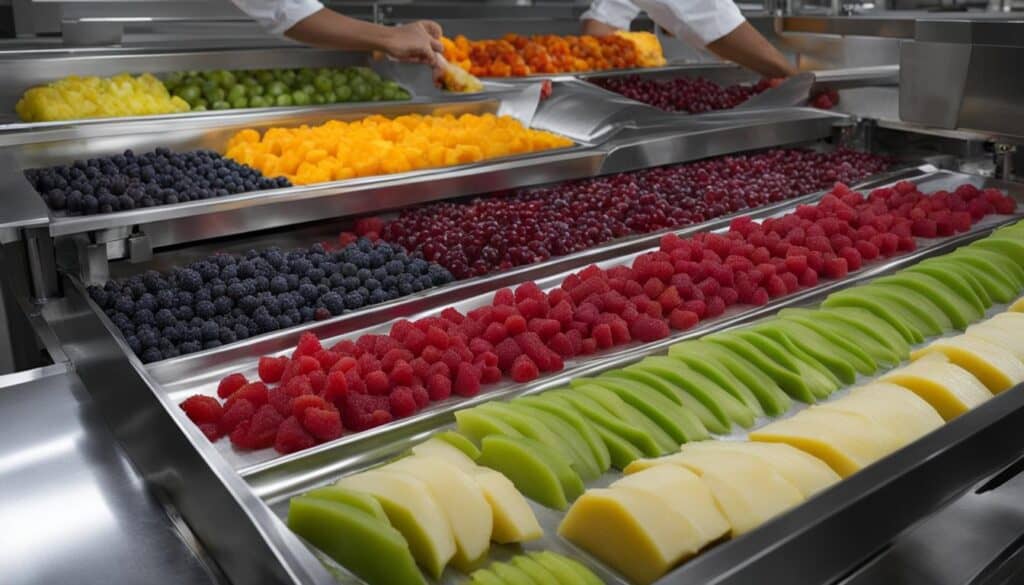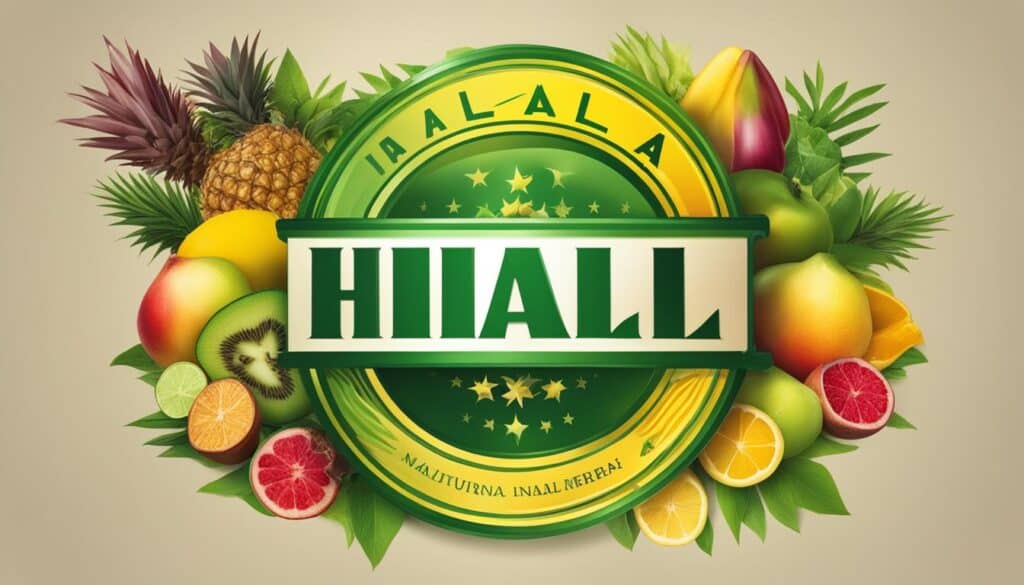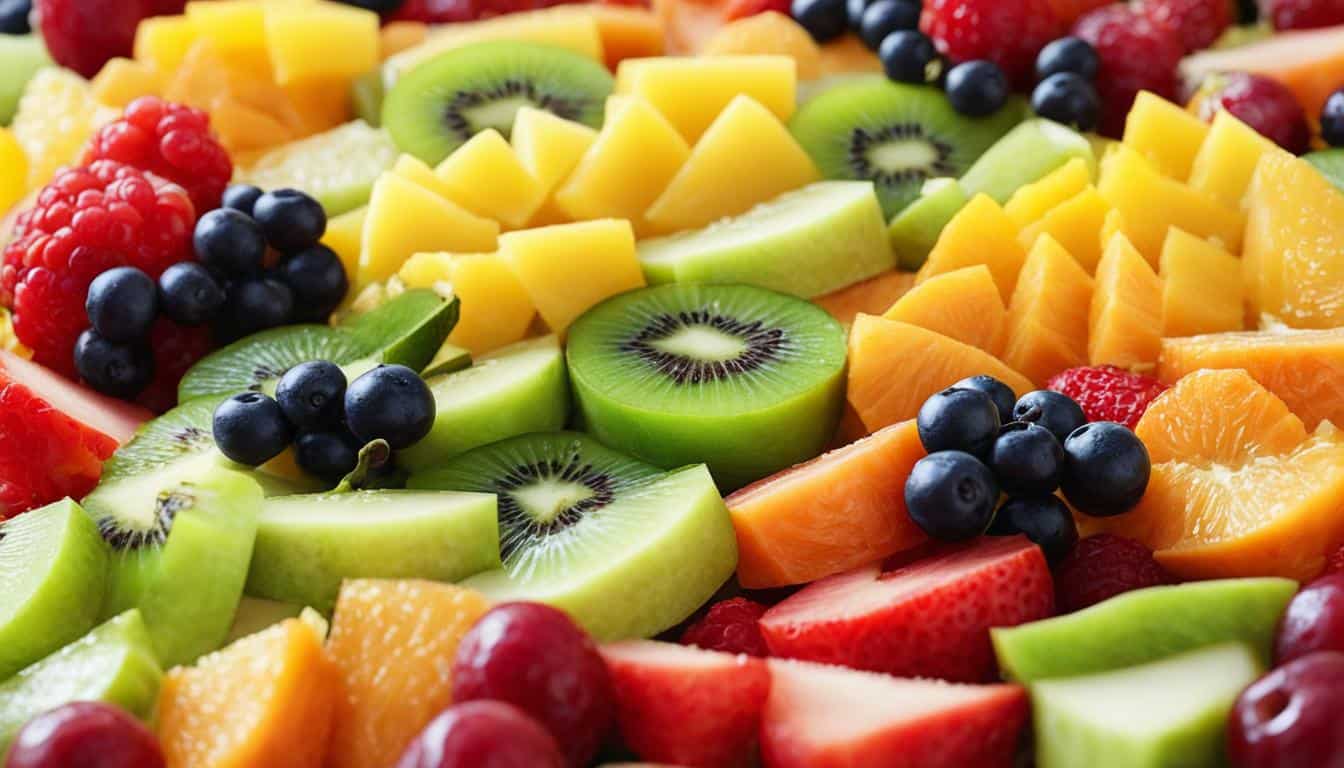Fruit Roll-Up is a beloved snack enjoyed by many. But for those of us who follow halal dietary guidelines, it’s important to determine if it’s permissible to consume. In this article, I’ll delve into the ingredients of Fruit Roll-Up, examine its halal certification details, and analyze the manufacturing process. Let’s find out if Fruit Roll-Up is halal or not.
The key considerations are:
- Ingredients – Some ingredients like gelatin or flavorings may be derived from non-halal sources like pigs. Fruit Roll-Ups do not contain gelatin but some flavors may be questionable.
- Certification – Some brands of Fruit Roll-Ups have halal certification while others don’t. Lack of certification does not necessarily mean it is haram but adds uncertainty.
- Manufacturing process – Even if ingredients are halal, cross-contamination during manufacturing may make the final product haram.
In summary:
- There is no gelatin or obvious non-halal ingredients in standard Fruit Roll-Ups.
- Some flavors or sources of production are questionable.
- Some brands have halal certification while others don’t.
So it depends on the specific brand and ingredients. The safe approach seems to be choosing a certified halal brand of Fruit Roll-Ups to avoid doubt. As always, checking with your local Imam is advisable if you are unsure.
Understanding Halal Dietary Laws
Halal dietary laws are a set of guidelines followed by Muslims to determine what foods are permissible for consumption. These laws are based on religious requirements and provide a framework for individuals to make informed choices when it comes to their diet.
When it comes to halal food options, these are foods that comply with the halal guidelines and meet the necessary criteria to be considered permissible. Halal snacks, on the other hand, are specifically snacks that have obtained halal certification to ensure they adhere to the dietary laws.
It is essential to understand these laws and guidelines in order to determine the halal status of different food products, including snacks like Fruit Roll-Up. By familiarizing ourselves with the principles of halal dietary laws, we can make informed decisions about the foods we consume.
Finding Halal Food Options
For individuals looking for halal food options, several alternatives are available. These options include:
- Fresh fruits and vegetables: This includes a wide variety of nutritious and delicious options, making it easy to satisfy your snack cravings while adhering to halal guidelines.
- Halal-certified snacks: Many reputable brands offer a range of halal-certified snacks, including biscuits, chips, and granola bars, to name a few.
- Homemade snacks: Another option is to prepare your own snacks at home using halal ingredients. This gives you complete control over the ingredients and ensures their compliance with halal guidelines.
By exploring these halal food options, individuals can enjoy a diverse and satisfying range of snacks while adhering to their religious beliefs.
“Understanding the principles of halal dietary laws helps us make conscious choices about the foods we consume, allowing us to enjoy delicious snacks without compromising our religious beliefs.”
Ingredients of Fruit Roll-Up
To determine the halal status of Fruit Roll-Up, it is necessary to examine its ingredients. The ingredients list includes various components such as fruit flavors, sugar, and preservatives. By analyzing these ingredients, we can determine if any non-halal substances are present.
Let’s take a closer look at the specific ingredients found in Fruit Roll-Up:
| Ingredients |
|---|
| Fruit flavors |
| Sugar |
| Preservatives |
Fruit flavors are a key component of Fruit Roll-Up, providing the delicious taste that makes it a popular snack. These flavors are derived from various fruits, such as strawberries, apples, or tropical fruits. While the specific fruits used may vary, they are generally considered halal as long as they are sourced from permissible sources.
Sugar is another ingredient commonly found in Fruit Roll-Up. It adds sweetness and helps preserve the product. Sugar is generally halal, as it is derived from natural sources such as sugarcane or sugar beets. However, it is important to ensure that the sugar used in Fruit Roll-Up is not processed using non-halal methods, such as bone char.
Preservatives are added to Fruit Roll-Up to extend its shelf life and maintain its freshness. These preservatives ensure that the product is safe for consumption. While specific preservatives may vary, it is important to ensure that they are halal-certified and sourced from permissible sources.
By examining the ingredients of Fruit Roll-Up, we can determine if they comply with halal guidelines. It is important to consider the source of the fruit flavors, the processing methods used for sugar, and the halal certification of the preservatives. This analysis will help us establish the halal status of Fruit Roll-Up.
Continue reading to Section 4 where we will analyze the halal status of Fruit Roll-Up based on the ingredients discussed here.
Analyzing the Halal Status of Fruit Roll-Up
When determining the halal status of Fruit Roll-Up, it is crucial to carefully analyze its ingredients and consider if they comply with halal guidelines. One potential concern is the use of animal-based ingredients like gelatin, which may be derived from non-halal sources. However, the presence of halal certification can provide assurance that the product is permissible for consumption.
Potential Concerns
One of the main concerns regarding the halal status of Fruit Roll-Up is the use of gelatin. Gelatin is commonly used as a thickening or gelling agent in many food products, including fruit roll-ups. However, it is important to note that gelatin can be derived from animal sources, which may or may not comply with halal requirements. To determine the source of gelatin used in Fruit Roll-Up, it is necessary to examine the ingredient list or consult the manufacturer.
“The presence of halal certification can provide assurance that the product is permissible for consumption.”
Halal Certification
Halal certification plays a crucial role in assuring consumers that a product meets the standards set by halal dietary laws. To obtain halal certification, manufacturers undergo a rigorous process that involves auditing and inspection of the entire manufacturing process. This includes scrutinizing ingredient sourcing, production methods, and packaging to ensure compliance with halal guidelines.
For Fruit Roll-Up, the presence of halal certification indicates that the product has met these requirements and can be consumed with confidence by individuals who adhere to halal dietary practices. The halal certification ensures that the ingredients used, including any potentially problematic components like gelatin, meet the necessary halal standards.
In Summary
While some ingredients in Fruit Roll-Up may raise concerns regarding their halal status, the presence of halal certification provides reassurance that the product is indeed permissible for consumption. Halal certification ensures that the manufacturing process complies with halal guidelines, including the sourcing and usage of ingredients. This helps individuals seeking halal-certified snacks to make informed choices and enjoy Fruit Roll-Up without compromising their dietary practices.
By analyzing the ingredients, considering potential concerns, and recognizing the importance of halal certification, it is determined that Fruit Roll-Up can be considered halal. The halal certification serves as a reliable indicator that the product meets the necessary requirements set forth by halal dietary laws.
The Manufacturing Process of Fruit Roll-Up
Understanding how Fruit Roll-Up is manufactured is crucial when determining its halal status. The production process involves various steps, including the preparation of the fruit mixture, spreading it onto sheets, drying, and packaging.
Preparation of Fruit Mixture
The first step in the manufacturing process of Fruit Roll-Up is the preparation of the fruit mixture. Real fruits are selected and processed to create a smooth and flavorful puree. The puree is then combined with other ingredients like sugar and flavorings to enhance the taste.
Spreading and Drying
Once the fruit mixture is ready, it is spread onto large sheets in a uniform thickness. This ensures that each Fruit Roll-Up has consistent texture and taste. The sheets are then placed in drying ovens where they are slowly dehydrated to remove the moisture. This step is essential for creating the chewy texture of Fruit Roll-Up.
Packaging
After the drying process is complete, the dried fruit sheets are cut into individual portions and packaged. The packaging is designed to preserve the freshness and prevent any contamination. Fruit Roll-Up is typically packed in individual plastic wrappers, making it a convenient and portable snack.
By examining each stage of the manufacturing process, we can ensure that the production of Fruit Roll-Up follows halal practices and does not involve any non-halal ingredients or methods.
| Manufacturing Process Steps | Description |
|---|---|
| Preparation of Fruit Mixture | Real fruits are processed into a puree and combined with other ingredients like sugar and flavorings. |
| Spreading and Drying | The fruit mixture is spread onto sheets and dried in ovens to remove moisture and create a chewy texture. |
| Packaging | The dried fruit sheets are cut into individual portions and packaged in plastic wrappers for freshness and convenience. |
Quote:
“The manufacturing process of Fruit Roll-Up involves careful selection and preparation of real fruits, ensuring a tasty and convenient snack option. By following halal practices and standards, Fruit Roll-Up can be enjoyed with confidence.”
Note: The image below represents the manufacturing process of Fruit Roll-Up.

Halal Certification for Fruit Roll-Up
Obtaining halal certification for a product involves a meticulous process to ensure compliance with halal dietary laws. Through thorough auditing and inspection, manufacturers demonstrate their commitment to providing halal products that meet the standards set forth by these laws.
The halal certification process encompasses various aspects of the manufacturing process, including ingredient sourcing, production, and packaging. Let’s take a closer look at each step to understand how halal certification guarantees the compliance of Fruit Roll-Up with halal guidelines.
Ingredient Sourcing
During the certification process, the source of each ingredient used in Fruit Roll-Up is thoroughly scrutinized. This examination ensures that there are no non-halal substances present in the ingredients. From fruit flavors to sweeteners and preservatives, all components are carefully evaluated to verify their halal status.
Production Process
The manufacturing process of Fruit Roll-Up undergoes strict evaluation to ensure adherence to halal standards. This includes examining the production methods to identify any potential non-halal practices. By implementing halal practices throughout the entire process, manufacturers guarantee that the product remains halal-compliant.
Packaging and Labeling
The packaging and labeling of Fruit Roll-Up are also essential factors in obtaining halal certification. The packaging must clearly indicate the halal status of the product, providing consumers with the necessary information to make informed choices. This ensures transparency and helps individuals easily identify halal products in the market.
By obtaining proper halal certification, manufacturers of Fruit Roll-Up not only meet the dietary needs of individuals adhering to halal guidelines but also uphold the integrity of their product. The certification process serves as an assurance for consumers and strengthens their trust in the product’s compliance with halal dietary laws.
Now that we have explored the halal certification process, let’s move forward to the conclusion and determine whether Fruit Roll-Up is halal based on the comprehensive analysis.

Is Fruit Roll-Up Halal?
Based on the analysis of the ingredients, manufacturing process, and halal certification, it can be concluded that Fruit Roll-Up is halal. The absence of non-halal ingredients and the presence of halal certification provide assurance that the product meets halal dietary guidelines.
Fruit Roll-Up undergoes a thorough examination of its ingredients to ensure that no non-halal substances are included. The manufacturing process is also closely monitored to ensure that it follows halal practices. Additionally, the product obtains halal certification, which verifies its compliance with halal dietary laws.
Halal certification is a rigorous process that involves auditing and inspecting the entire manufacturing process, including ingredient sourcing, production, and packaging. By obtaining halal certification, Fruit Roll-Up manufacturers demonstrate their commitment to providing halal products to consumers.
The following table provides an overview of the key factors that contribute to the halal status of Fruit Roll-Up:
| Factor | Halal Status |
|---|---|
| Ingredients | Does not contain non-halal substances |
| Manufacturing Process | Follows halal practices |
| Halal Certification | Obtained halal certification |
By considering these factors, it can be confidently stated that Fruit Roll-Up is a halal snack option that adheres to the dietary guidelines of individuals seeking halal food choices.
Alternatives to Fruit Roll-Up for Halal Snack Options
When looking for halal snack options, there are plenty of alternatives to Fruit Roll-Up that you can explore. These options offer a wider range of choices for individuals adhering to halal dietary guidelines. Consider the following alternatives:
Fruit-Based Snacks
There are numerous fruit-based snacks available on the market that can satisfy your cravings while adhering to halal guidelines. These snacks are often made with real fruits and natural ingredients, providing a healthy and tasty option. Some popular fruit-based snacks include:
- Fruit leathers
- Dried fruits
- Fruit chips
Homemade Snacks
Creating your own snacks at home allows you to have full control over the ingredients and ensure they are halal. Consider making your own fruit roll-ups using fresh fruits and other halal ingredients. This way, you can customize the flavors and textures according to your preference. Get creative in the kitchen and enjoy the satisfaction of homemade halal snacks.
Certified Halal Snacks
If you prefer the convenience of pre-packaged snacks, look for certified halal snacks from reputable brands. These snacks have undergone thorough halal certification processes, ensuring that they meet the strict guidelines of halal dietary laws. Check for recognized halal certification symbols on the packaging to make sure you’re selecting authentic halal snacks.
Remember, when it comes to halal snack options, there are plenty of alternatives to Fruit Roll-Up. Whether you choose fruit-based snacks, homemade treats, or certified halal snacks, you can indulge in delicious snacks while staying true to your dietary requirements.

Taking Precautions and Seeking Certainty
While Fruit Roll-Up is deemed halal based on the information available, it is always important to take precautions and seek certainty when it comes to consuming halal food. As a conscientious consumer, there are a few steps you can take to ensure complete compliance with halal dietary laws.
Reading Labels
One of the first steps is to carefully read the labels of food products, including snacks like Fruit Roll-Up. Look out for any ingredients that may raise concerns regarding their halal status. By familiarizing yourself with the halal guidelines and understanding the meaning behind different ingredients, you can make informed decisions about the products you choose to consume.
Researching Product Information
Beyond the labels, conduct thorough research on the product’s background and manufacturing processes. Look for information from reputable sources, including the brand’s website or official certifications. This additional research can provide valuable insights into the production methods and further support the halal status of the product.
Consulting with Reliable Halal Certification Organizations
In case of any doubts or uncertainties, consider reaching out to reliable halal certification organizations or Islamic scholars who specialize in halal dietary laws. They can provide guidance and clarity regarding specific products, including snacks like Fruit Roll-Up. These experts have the knowledge and expertise to address any concerns you may have and help you make well-informed decisions.
“Taking precautions and seeking certainty when consuming halal food ensures that you are adhering to your religious dietary guidelines and enjoying food with peace of mind.”
By taking these precautions and seeking certainty, you can confidently enjoy halal food options and snacks, including Fruit Roll-Up. Remember, halal certification provides a level of assurance, but it’s essential to continue practicing diligence and maintaining a thorough understanding of halal dietary guidelines.
In the next section, we will explore alternative halal snack options that can provide variety and satisfy your cravings. These alternatives will give you more choices while ensuring that you adhere to your halal dietary requirements.
The Importance of Halal Certification
Halal certification plays a vital role in providing Muslims with peace of mind when it comes to consuming food products. It indicates that a product has undergone strict scrutiny and meets the requirements of halal dietary guidelines. Halal certification ensures transparency and allows consumers to make informed choices about the products they consume.
“Halal certification ensures that Muslims can confidently enjoy a wide range of food products while adhering to their religious beliefs.”
The process of halal certification involves careful inspection and verification of the entire supply chain, from sourcing ingredients to manufacturing and packaging. The certification assures consumers that halal standards have been followed throughout the production process, eliminating any doubts or concerns about the product’s halal status.
Benefits of Halal Certification
Halal certification provides several significant benefits, both for consumers and manufacturers:
- Consumer Confidence: Halal certification gives Muslim consumers confidence that the product they are purchasing and consuming is in accordance with their dietary requirements.
- Market Access: Halal certification enables manufacturers to access the growing global market of Muslim consumers, which is estimated to be over 1.9 billion people worldwide.
- Brand Reputation: Halal certification enhances a brand’s reputation and builds trust among consumers, as it demonstrates the brand’s commitment to meeting the highest halal standards.
- Export Opportunities: Halal certification opens doors to international markets that have stringent halal requirements, providing manufacturers with increased export opportunities.
By obtaining halal certification, manufacturers demonstrate their dedication to catering to the needs of Muslim consumers while ensuring compliance with halal dietary laws.
With the growing awareness and demand for halal products, halal certification has become an essential aspect of the food industry. It not only ensures the halal status of products but also fosters trust and transparency between manufacturers and consumers.
| Benefits of Halal Certification | |
|---|---|
| Consumer Confidence | Ensures Muslims can trust the product’s halal status. |
| Market Access | Allows manufacturers to tap into a large global market of Muslim consumers. |
| Brand Reputation | Enhances brand credibility and builds trust among consumers. |
| Export Opportunities | Enables manufacturers to access international markets with strict halal requirements. |
The above table highlights the benefits of halal certification and reinforces its significance in the food industry. It showcases how halal certification not only meets the needs of Muslim consumers but also provides valuable opportunities for manufacturers to expand their market reach.
Conclusion
In conclusion, Fruit Roll-Up can be considered halal based on its ingredients, manufacturing process, and halal certification. The analysis of the ingredients reveals no non-halal substances, and the manufacturing process ensures compliance with halal guidelines. Additionally, the presence of halal certification provides further assurance of the product’s halal status.
However, it is important to remember that when consuming any food product, including Fruit Roll-Up, practicing diligence and seeking assurance is crucial. Reading labels, researching product information, and consulting with reliable halal certification organizations can help ensure complete compliance with halal dietary laws.
For individuals who adhere to halal dietary guidelines, exploring a variety of halal snack options is recommended. While Fruit Roll-Up is a permissible choice, there are other alternatives available, including other fruit-based snacks, homemade options, and certified halal snacks from reputable brands. By making informed choices and trying different options, individuals can enjoy a diverse range of delicious and halal snacks that align with their religious beliefs.
FAQ
Is Fruit Roll-Up halal?
Yes, Fruit Roll-Up can be considered halal based on its ingredients, manufacturing process, and halal certification.
What are halal dietary laws?
Halal dietary laws are guidelines followed by Muslims to determine what foods are permissible for consumption.
What are halal food options?
Halal food options are those that comply with the guidelines set forth by halal dietary laws.
What are the ingredients of Fruit Roll-Up?
The ingredients of Fruit Roll-Up include fruit flavors, sugar, and preservatives.
Does Fruit Roll-Up have halal certification?
Yes, Fruit Roll-Up has obtained halal certification, which ensures it meets the standards set forth by halal dietary laws.
How is Fruit Roll-Up manufactured?
The manufacturing process of Fruit Roll-Up involves steps such as preparing the fruit mixture, spreading it onto sheets, drying, and packaging.
What is halal certification for Fruit Roll-Up?
Halal certification is a rigorous process that includes auditing and inspection of the entire manufacturing process to ensure compliance with halal dietary laws.
Are there alternatives to Fruit Roll-Up for halal snack options?
Yes, there are various alternatives to Fruit Roll-Up available, including other fruit-based snacks, homemade snacks, and certified halal snacks from reputable brands.
How can I seek certainty when consuming halal food?
You can seek certainty when consuming halal food by reading labels, researching product information, and consulting with reliable halal certification organizations.
What is the importance of halal certification?
Halal certification plays a vital role in providing Muslims with peace of mind when it comes to consuming food products, ensuring they meet halal dietary guidelines.





Leave a Reply